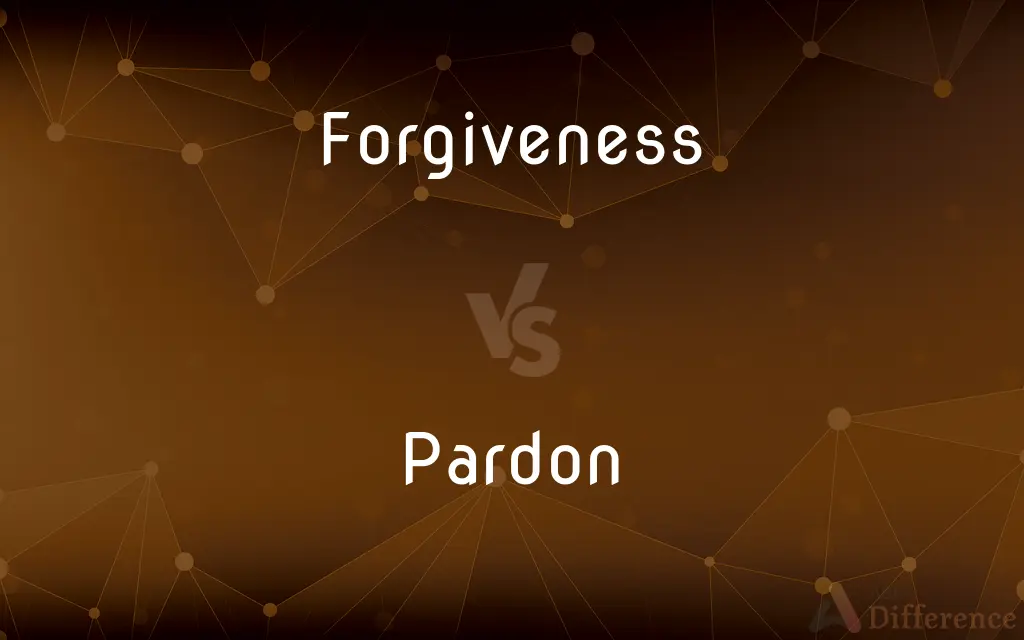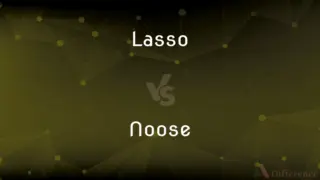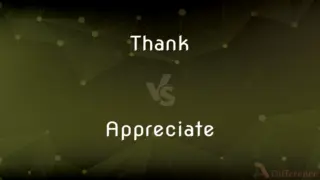Forgiveness vs. Pardon — What's the Difference?
Edited by Tayyaba Rehman — By Maham Liaqat — Updated on April 30, 2024
Forgiveness is an emotional release of resentment, often personal and informal, whereas pardon is a formal act, typically legal, absolving someone from consequences.

Difference Between Forgiveness and Pardon
Table of Contents
ADVERTISEMENT
Key Differences
Forgiveness primarily involves letting go of personal grievances and emotional burdens, often occurring in interpersonal relationships. On the other hand, pardon is a legal exoneration that releases an individual from the consequences of an offense, often granted by a governmental authority.
While forgiveness does not necessarily require formal acknowledgment or restitution, pardon is often documented and comes with legal implications, such as clearing one’s criminal record.
Forgiveness can be offered by anyone aggrieved and does not have a formal process or prerequisites. In contrast, pardon is usually subject to legal criteria and formal procedures, typically involving a review by a legal authority or a head of state.
While forgiveness is more about the emotional and psychological healing of the individual who forgives, pardon focuses on societal and legal restoration and the public aspect of justice.
Forgiveness may or may not restore a personal relationship, as it depends on the individuals involved. On the other hand, a pardon does not necessarily imply personal reconciliation but restores legal status.
ADVERTISEMENT
Comparison Chart
Definition
Emotional letting go of resentment
Legal exoneration from penalties
Initiated by
Individual (personal capacity)
Authority (legal capacity)
Formality
Informal and personal
Formal and legal
Outcome
Emotional and psychological relief
Legal restoration and status change
Relationship to Consequences
No impact on legal consequences
Typically removes legal consequences
Compare with Definitions
Forgiveness
Letting go of grudges against someone for an offense.
She found forgiveness in her heart after his sincere apology.
Pardon
A formal declaration of forgiveness of a crime by a figure of authority.
The pardon allowed him to start a new life.
Forgiveness
A decision to pardon an emotional debt.
His forgiveness of their past disputes saved their friendship.
Pardon
A tool for justice system to show mercy.
The pardon was an example of the system's capacity for mercy.
Forgiveness
Offering mercy without harboring old grievances.
Forgiveness was the first step towards their reconciliation.
Pardon
A legal act absolving someone from the consequences of a crime.
The governor issued a pardon, clearing the individual's record.
Forgiveness
A personal process of overcoming resentment.
Forgiveness can often lead to healing and peace.
Pardon
Exemption from legal penalties by a competent authority.
The presidential pardon came as a surprise to many.
Forgiveness
An emotional state of releasing blame.
Forgiveness brought them closer after the misunderstanding.
Pardon
An official forgiveness that restores rights.
His pardon restored his civil rights, like voting.
Forgiveness
Forgiveness, in a psychological sense, is the intentional and voluntary process by which one who may initially feel victimized, undergoes a change in feelings and attitude regarding a given offense, and overcomes negative emotions such as resentment and vengeance (however justified it might be). Theorists differ, however, in the extent to which they believe forgiveness also implies replacing the negative emotions with positive attitudes (i.e.
Pardon
A pardon is a government decision to allow a person to be relieved of some or all of the legal consequences resulting from a criminal conviction. A pardon may be granted before or after conviction for the crime, depending on the laws of the jurisdiction.Pardons can be granted in many countries when individuals are deemed to have demonstrated that they have "paid their debt to society", or are otherwise considered to be deserving of them.
Forgiveness
The act of forgiving; pardon.
Pardon
The action of forgiving or being forgiven for an error or offence
He obtained pardon for his sins
Forgiveness
The action of forgiving.
He begged for forgiveness after being caught stealing from the shop.
Pardon
Forgive or excuse (a person, error, or offence)
I know Catherine will pardon me
Forgiveness
Readiness to forgive.
Pardon
A request to a speaker to repeat something because one did not hear or understand it
‘Pardon?’ I said, cupping a hand to my ear
Forgiveness
The act of forgiving; the state of being forgiven; as, the forgiveness of sin or of injuries.
To the Lord our God belong mercies and forgivenesses.
In whom we have . . . the forgiveness of sin.
Pardon
To release (a person) from punishment or disfavor for wrongdoing or a fault
A convicted criminal who was pardoned by the governor.
Forgiveness
Disposition to pardon; willingness to forgive.
If thou, Lord, shouldest mark iniquities, O Lord, who shall stand? But there is forgiveness with thee, that thou mayest be feared.
Pardon
To allow (an offense or fault) to pass without punishment or disfavor.
Forgiveness
Compassionate feelings that support a willingness to forgive
Pardon
To make courteous allowance for; excuse
Pardon me, I'm in a hurry.
Forgiveness
The act of excusing a mistake or offense
Pardon
The act of pardoning.
Pardon
Exemption of a convicted person from the penalties of an offense or crime by the power of the executor of the laws.
Pardon
An official document or warrant declaring such an exemption.
Pardon
Allowance or forgiveness for an offense or a discourtesy
Begged the host's pardon for leaving early.
Pardon
Roman Catholic Church An indulgence.
Pardon
Forgiveness for an offence.
Pardon
(legal) An order that releases a convicted criminal without further punishment, prevents future punishment, or (in some jurisdictions) removes an offence from a person's criminal record, as if it had never been committed.
Pardon
(transitive) To forgive (a person).
Pardon
(transitive) To refrain from exacting as a penalty.
Pardon
To grant an official pardon for a crime.
Pardon
Often used when someone does not understand what another person says.
Pardon
The act of pardoning; forgiveness, as of an offender, or of an offense; release from penalty; remission of punishment; absolution.
Pardon, my lord, for me and for my tidings.
But infinite in pardon was my judge.
Pardon
An official warrant of remission of penalty.
Sign me a present pardon for my brother.
Pardon
The state of being forgiven.
Pardon
A release, by a sovereign, or officer having jurisdiction, from the penalties of an offense, being distinguished from amnesty, which is a general obliteration and canceling of a particular line of past offenses.
Pardon
To absolve from the consequences of a fault or the punishment of crime; to free from penalty; - applied to the offender.
In this thing the Lord pardon thy servant.
I pray you, pardon me; pray heartily, pardon me.
Pardon
To remit the penalty of; to suffer to pass without punishment; to forgive; - applied to offenses.
I pray thee, pardon my sin.
Apollo, pardonMy great profaneness 'gainst thine oracle!
Pardon
To refrain from exacting as a penalty.
I pardon thee thy life before thou ask it.
Pardon
To give leave (of departure) to.
Even now about it! I will pardon you.
Pardon
The act of excusing a mistake or offense
Pardon
A warrant granting release from punishment for an offense
Pardon
The formal act of liberating someone
Pardon
Accept an excuse for;
Please excuse my dirty hands
Pardon
Grant a pardon to;
Ford pardoned Nixon
The Thanksgiving turkey was pardoned by the President
Common Curiosities
Can forgiveness affect legal status?
No, forgiveness is personal and does not change legal status or consequences.
Is forgiveness a requirement for pardon?
Forgiveness is not a prerequisite for a pardon, which is a legal decision.
What is the main emotional focus of forgiveness?
Forgiveness focuses on letting go of personal resentment and emotional healing.
What are the legal effects of a pardon?
A pardon generally removes legal penalties and may restore rights such as voting.
Can a private individual grant a pardon?
No, only authorized public officials can issue pardons.
Does a pardon imply personal forgiveness?
No, a pardon is a legal action and does not necessarily reflect personal feelings.
Who can grant a pardon?
A pardon can only be granted by someone with legal authority, such as a president or governor.
What drives a person to forgive?
Forgiveness is often driven by a desire for personal peace and emotional closure.
Is forgiveness always mutual?
Forgiveness can be one-sided and does not require acceptance or acknowledgment by the other party.
Can forgiveness influence a decision to grant a pardon?
While unrelated legally, personal forgiveness might influence public sentiment and indirectly impact decisions.
Can pardon be revoked?
Generally, pardons are final, but this can vary depending on the legal jurisdiction.
How does society benefit from pardons?
Pardons can rehabilitate an individual’s standing in society and reinforce the justice system’s capacity for mercy.
Share Your Discovery

Previous Comparison
Lasso vs. Noose
Next Comparison
Thank vs. AppreciateAuthor Spotlight
Written by
Maham LiaqatEdited by
Tayyaba RehmanTayyaba Rehman is a distinguished writer, currently serving as a primary contributor to askdifference.com. As a researcher in semantics and etymology, Tayyaba's passion for the complexity of languages and their distinctions has found a perfect home on the platform. Tayyaba delves into the intricacies of language, distinguishing between commonly confused words and phrases, thereby providing clarity for readers worldwide.
















































